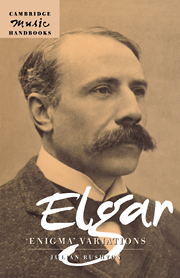2 - Variations: the theme
Published online by Cambridge University Press: 02 December 2009
Summary
Precedents
The orchestral variation set was a well-established genre before Elgar, and Op. 36 is part of a remarkable surge of interest in this form in Britain at the end of the nineteenth century. Orchestral variations, unlike those for solo instruments, are seldom merely ornamental. They diverge, therefore, from the virtuosic type of variation, which mostly overlays the theme with an encrustation of jewellery. The virtuoso type is not necessarily shallow; sets of studies in the form of variations composed by Beethoven (the C minor variations, WoO 80) and Brahms (the Paganini variations, Op. 35) combine virtuosity with strictness to attain the peculiar musical power which resides only in the utmost abstraction from extramusical considerations. Ornamental techniques are naturally used for concertante variations, such as Tchaikovsky's Variations on a Rococo Theme for cello and orchestra (1876) or Franck's Symphonic Variations (1885), which are more than merely diverting.
In the nineteenth century, genres have a happy way of overlapping, resulting at best not in confusion but in richness. Orchestral sets of variations without a soloist are often designated ‘symphonic’: such variations translate the spirit of strict, nonvirtuosic, and usually abstract, variation patterns to the symphony orchestra, and aspire to match the symphony in energy, seriousness, and the prestige of being heard as a concert item, a context of edification as of entertainment. Variation form lends itself particularly well to an utterance directed at a public whose musical education and concentration might not match its enthusiasm, for it provides the listener with repeated points of melodic and structural reference.
- Type
- Chapter
- Information
- Elgar: Enigma Variations , pp. 18 - 32Publisher: Cambridge University PressPrint publication year: 1999



